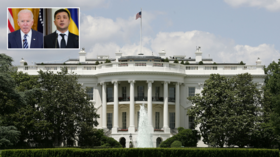China’s refinery crackdown leaves oil tankers with nowhere to go

China is cracking down on its private-sector oil refiners in a bid to close tax loopholes and mitigate pollution.
Approximately a quarter of the nation’s mammoth refining capacity comes from these independent refineries, known as “teapots.”
Beijing allowed these private refiners with their most limited crude import quota since 2015, when teapots were first able to directly buy their own oil. This blow to a significant portion of the nation’s refining capacity is currently causing major disruption to the supply chain of crude oil in the region. This is not only a problem for China’s oil supply and voracious demand, but for all of the many countries that supply petroleum to the world’s largest crude oil importer. Because of the crackdown, oil tankers are currently piling up off the shores of key Asian ports.
Also on rt.com China discovers massive shale deposit at its largest oil field“Vessels off Singapore, Malaysia and China had about 62 million barrels last week after hitting a near three-month high earlier this month,” Bloomberg reported earlier this week.
Some of these stranded ships are carrying oil from Iran and Venezuela, countries which are currently under sanction from the United States, and which will therefore have a very hard time finding another buyer for their oil if the Chinese market dries up.
“These barrels sitting off Southeast Asia are distressed,” Braemar ACM Shipbroking’s tanker researcher Anoop Singh told Bloomberg. “They’re going to have a tough time finding homes other than China, unless the situation surrounding the US sanctions changes dramatically, or China’s clampdown on its independents is eased.”
Also on rt.com China’s commodity stockpiles remain a complete mysteryThe sticky situation for the sanctioned oil is compounded by a Chinese consumption tax that Beijing rolled out in June as part of its extended crackdown. With the stated purpose of addressing pollution, the tax impacts bitumen blends used for road-making, which have historically served as a cover for the comings and goings of Iranian and Venezuelan crude. The tax has hit imports hard, with bitumen imports shrinking by a massive 80 percent since their peak in May.
Read more on Oilprice.com: Fujairah oil terminal to upgrade as crude trade is expected to surge
In the last five years, China’s teapots have gained significant power in China’s energy sector. The current crackdown serves a dual purpose. According to Chinese officials, the goal is to shore up oversight, ensure legal compliance, and cut back on widespread bad behaviors such as tax evasion, fuel smuggling, and violations of environmental and emissions standards. Unofficially, however, the crackdown serves to re-establish state control over private-sector entities who have gotten a little big for their britches in the eyes of Beijing.
While the politics of the oil pileup are complex and especially fraught for Venezuela and Iran, whose suffering economies will be hit hard by their trickle of oil trade drying up, the move is a popular one among environmentalists and climate activists. Earlier this month the United Nations and the Intergovernmental Panel on Climate Change sounded a “code red for humanity” in a damning report announcing that the world has reached a point of no return for global warming. Any amount of oil that remains unused can be seen as a win for the climate, even if that oil is doomed to float off Asian shores for the foreseeable future.
Also on rt.com China's first independent deepwater oil & gas project starts operating ahead of scheduleArguably, no nation is as instrumental in the fight against climate change as China, the world’s largest carbon dioxide emitter and its second-largest economy. President Xi Jinping has committed to lofty climate pledges, promising that China will reach peak oil demand by just 2030 and go completely carbon neutral by 2060, but it’s also clear that China’s primary goal is energy security at any cost. For example, Beijing has ramped up coal production overseas at the same time it promises to limit its domestic capacity.
Whether or not China’s private refinery crackdown is aimed at compliance with environmental regulations or with re-establishing the state’s chokehold on the sector, however, refining and burning less oil in China stands to have some very good consequences for all of us.
This article was originally published on Oilprice.com













